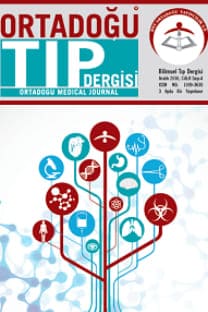Tinnitus With Normal Hearing Population: A Retrospective Chart Review of High Frequency Audiometry, Quality of Life and Laboratory Findings
Normal İşiten Popülasyonda Tinnitus: Yüksek Frekans Odyometri,Yaşam Kalitesi Anketleri ve Laboratuvar Bulgularının Retrospektif İncelenmesi
___
- 1. American Tinnitus Association.www.ATA.org. accessed in September, 2009. 2. Ochi K, Ohashi T, Kenmochi M. Hearing impairment and tinnitus pitch in patients with unilateral tinnitus: comparison of sudden hearing loss and chronic tinnitus. Laryngoscope 2003; 113: 427-31. 3. Olzowy B, Canis M, Hempel JM, et al. Effect of atorvastatin on progression of sensorineural hearing loss and tinnitus in the elderly: results of a prospective, randomized, double-blind clinical trial. Otol Neurotol 2007; 28: 455-8. 4. Du Z, Yang Y, Hu Y, et al. A long-term high-fat diet increases oxidative stress, mitochondrial damage and apoptosis in the inner ear of D-galactose-induced aging rats. Hear Res 2012; 287:15-24. 5. Aimoni C, Bianchini C, Borin M, et al. Diabetes, cardiovascular risk factors and idiopathic sudden sensorineural hearing loss: a case-control study. Audiol Neurootol 2010; 15: 111-5. 6. Campos GR, Moura KH, Sarmento CT, et al. Is the Degree of Discomfort Caused by Tinnitus in Normal-Hearing Individuals Correlated with Psychiatric Disorders? Otolaryngol Head Neck Surg 2013; 48: 658-63. 7. Zirke N, Seydel C, Szczepek AJ, et al. Psychological comorbidity in patients with chronic tinnitus: analysis and comparison with chronic pain, asthma or atopic dermatitis patients. Qual Life Res 2013; 22: 263-72. 8. Das SK, Wineland A, Kallogjeri D, Piccirillo JF. Cognitive speed as an objective measure of tinnitus. Laryngoscope 2012; 122: 2533-8. 9. Monzani D, Barillari MR, Alicandri Ciufelli M, et al. Effect of a fixed combination of nimodipine and betahistine versus betahistine as monotherapy in the long-term treatment of Ménière's disease: a 10-year experience. Acta Otorhinolaryngol Ital 2012; 32: 393-403. 10. Kuk FK, Tyler RS, Russell D, Jordan H. The psychometric properties of a tinnitus handicap questionnaire.Ear Hear. 1990; 11: 434-45. 11. Ohsaki K, Ueno M, Zheng HX, et al. Evaluation of tinnitus patients by peroral multi-drug treatment. Auris Nasus Larynx 1998; 25: 149-54. 12. Crocetti A, Forti S, Ambrosetti U, Bo LD. Questionnaires to evaluate anxiety and depressive levels in tinnitus patients. Otolaryngol Head Neck Surg 2009; 140: 403-5. 13. Almeida TA, Samelli AG, Mecca Fdel N, et al. Tinnitus sensation pre and post nutritional intervention in metabolic disorders. Pro Fono 2009; 21: 291-7. 14. Shemesh Z, Attias J, Ornan M, et al. Vitamin B12 deficiency in patients with chronic-tinnitus and noise-induced hearing loss. Am J Otolaryngol 1993; 14: 94-9. 15. Cai Q, Du X, Zhou B, et al. Effects of simvastatin on plasma lipoproteins and hearing loss in apolipoprotein E gene-deficient mice.ORL J Otorhinolaryngol Relat Spec 2009; 71: 244-50. 16. Saito T, Sato K, Saito H. An experimental study of auditory dysfunction associated with hyperlipoproteinemia. Arch Otorhinolaryngol 1986; 243: 242-5. 17. Sutbas A, Yetiser S, Satar B, et al. Low-cholesterol diet and antilipid therapy in managing tinnitus and hearing loss in patients with noise-induced hearing loss and hyperlipidemia. Int Tinnitus J 2007; 13: 143-9. 18. M-Shirazi M, Farhadi M, Jalessi M, et al. Prevalence of dyslipidemia among Iranian patients with idiopathic tinnitus. J Res Med Sci 2011; 16: 890-6. 19. Suckfüll M, Hearing Loss Study Group. Fibrinogen and LDL apheresis in treatment of sudden hearing loss: a randomised multicentre trial. Lancet. 2002; 360:1811-7. Erratum in: Lancet; 361: 1916. 20. Kariya S, Cureoglu S, Fukushima H, et al. Comparing the cochlear spiral modiolar artery in type-1 and type-2 diabetes mellitus:a human temporal bone study. Acta Med Okayama 2010; 64: 375-83. 21. Fujita T, Yamashita D, Katsunuma S, et al. Increased inner ear susceptibility to noise injury in mice with streptozotocin-induced diabetes. Diabetes 2012; 61: 2980-6. 22. Hamed SA, El-Attar AM. Cochlear dysfunction in hyperuricemia: otoacoustic emission analysis.Am J Otolaryngol 2010; 31: 154-61. 23. Sun AH, Li JY, Xiao SZ, et al. Changes in the cochlear iron enzymes and adenosine triphosphatase in experimental iron deficiency. Ann Otol Rhinol Laryngol 1990; 99: 98892. 24. Sun AH, Wang ZM, Xiao SZ, et al. Sudden sensorineural hearing loss induced by experimental iron deficiency in rats. ORL 1992; 54:24650. 25. Ochi K, Kinoshita H, Kenmochi M, et al. Zinc deficiency and tinnitus. Auris Nasus Larynx 2003; 30: S25-8. 26. Gopinath B, McMahon CM, Rochtchina E, et al. Incidence, persistence, and progression of tinnitus symptoms in older adults: the Blue Mountains Hearing Study. Ear Hear 2010; 31: 407-12. 27. Vanneste S, To WT, De Ridder D. The psychometric properties of the Tinnitus Handicap Questionnaire in a Dutch-speaking population. Clin Otolaryngol 2011; 36: 9-16.
- Yayın Aralığı: 4
- Başlangıç: 2009
- Yayıncı: MEDİTAGEM Ltd. Şti.
Arzu TUZUNER, Refik ÇAYLAN, Hatice KARADAŞ, Cemile AÇIKGÖZ, Yunus KARADAVUT
Pseudomonas Putida'ya Bağlı Olarak Septik Artrit Gelişen Olgu
Alper DEVECİ, Nilgün ALTIN, Kamer KOLDAŞ, Göknur TOROS YAPAR, Salih CESUR
Yoğun Bakım Ünitesinde Takip Edilen İntoksikasyon Olgularının Retrospektif Olarak İncelenmesi
Ayşegül ŞAHİN ELBİR, Mustafa TEKİN, Erdal ÖZCAN, Serkan TAŞTAN, Ayça Tuba ÖZCAN DUMANLI
B12 Vitamin Eksikliğine Bağlı Megaloblastik Anemi ile Ca 15-3 İlişkisi: Olgu Sunumu
Ali KOŞAR, Şahin BALÇIK, Fatma KEREN, Eda ŞİMŞEK TANRIKULU
Yoğun Bakım Ünitelerinde Nütrisyon Desteğinin Önemi
The Role of Bilaterally Applied Schirmer Test in The Assesment of Dry Eye Disease
Kronik Hepatit B Hastalarında Delta Hepatit Sıklığı: Tek Merkez Retrospektif Çalışma
Emin ALTIPARMAK, Enver ÜNER, Ahmet YOZGAT, Ersan ÖZASLAN, Faruk ÇETİN, Ahmet Teoman ERTEN, Selim DEMİRCİ, Murat ALİYAZICIOĞLU, Özge ÇAĞLAYAN, Hasan Tankut KÖSEOĞLU
